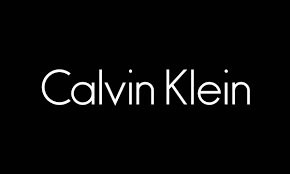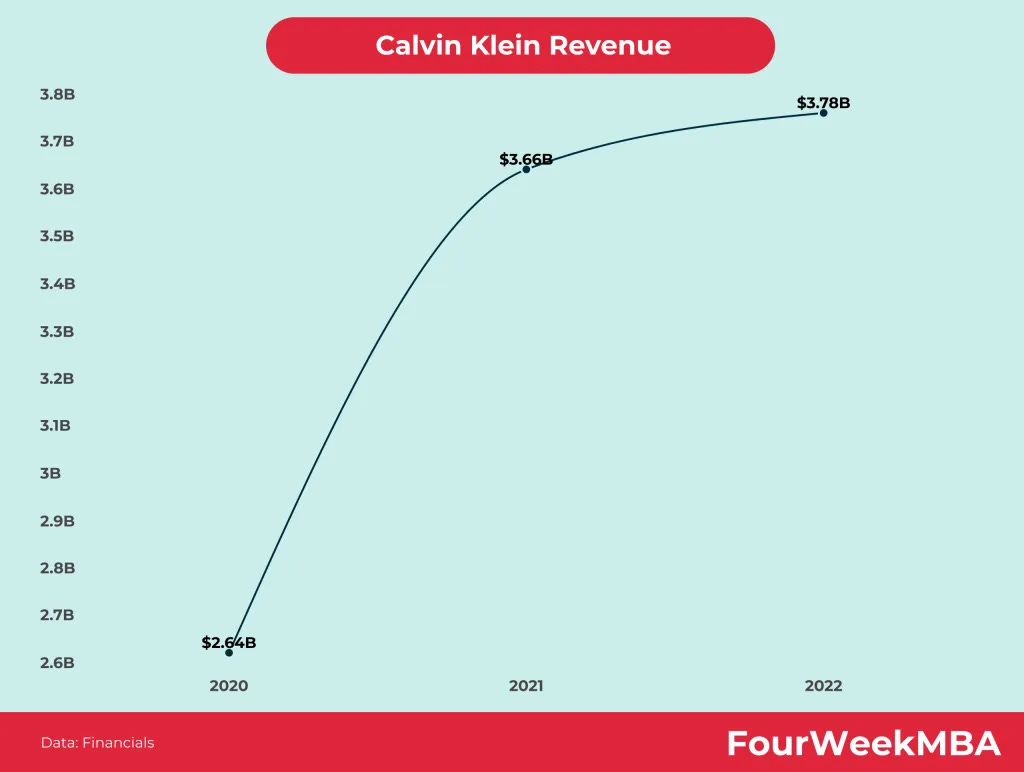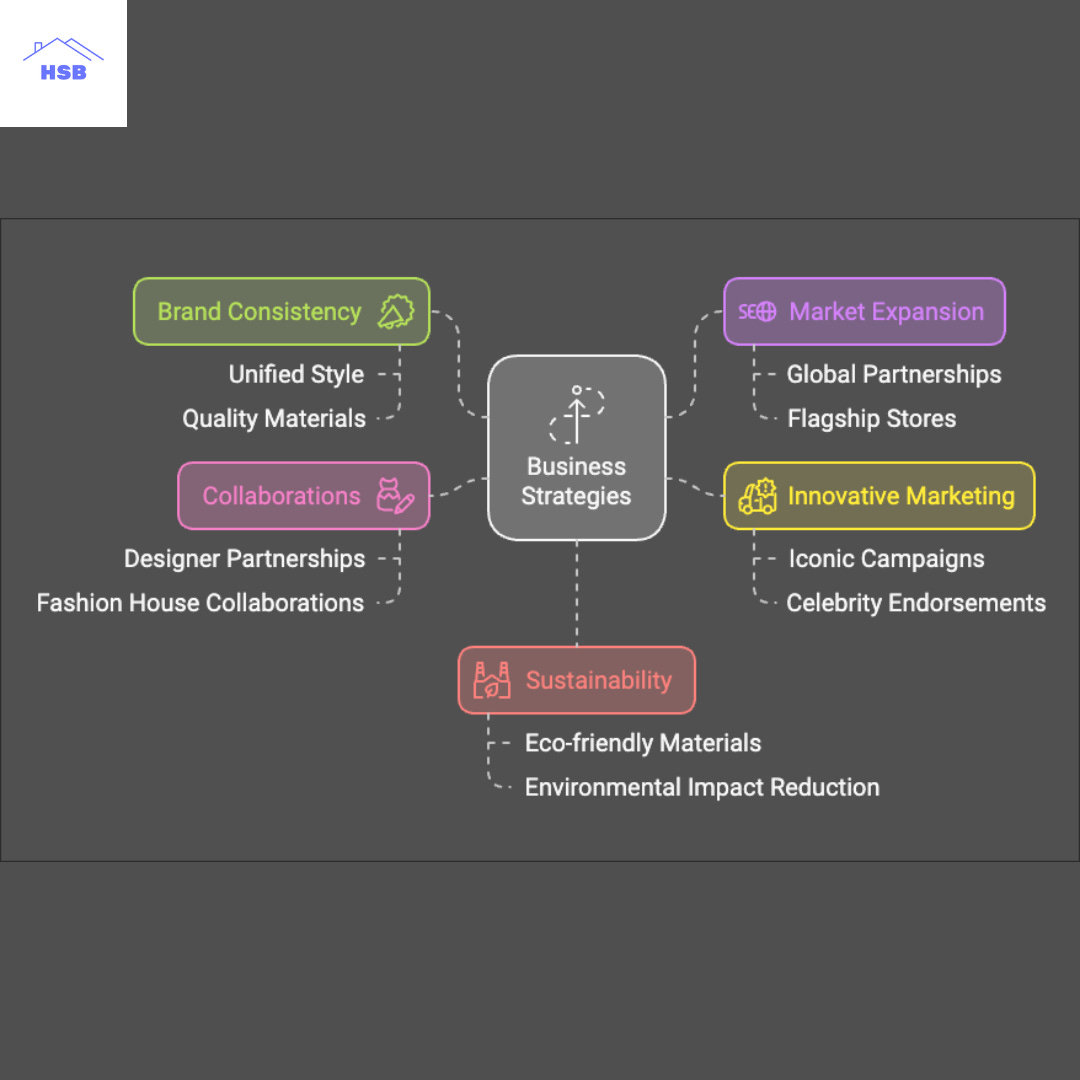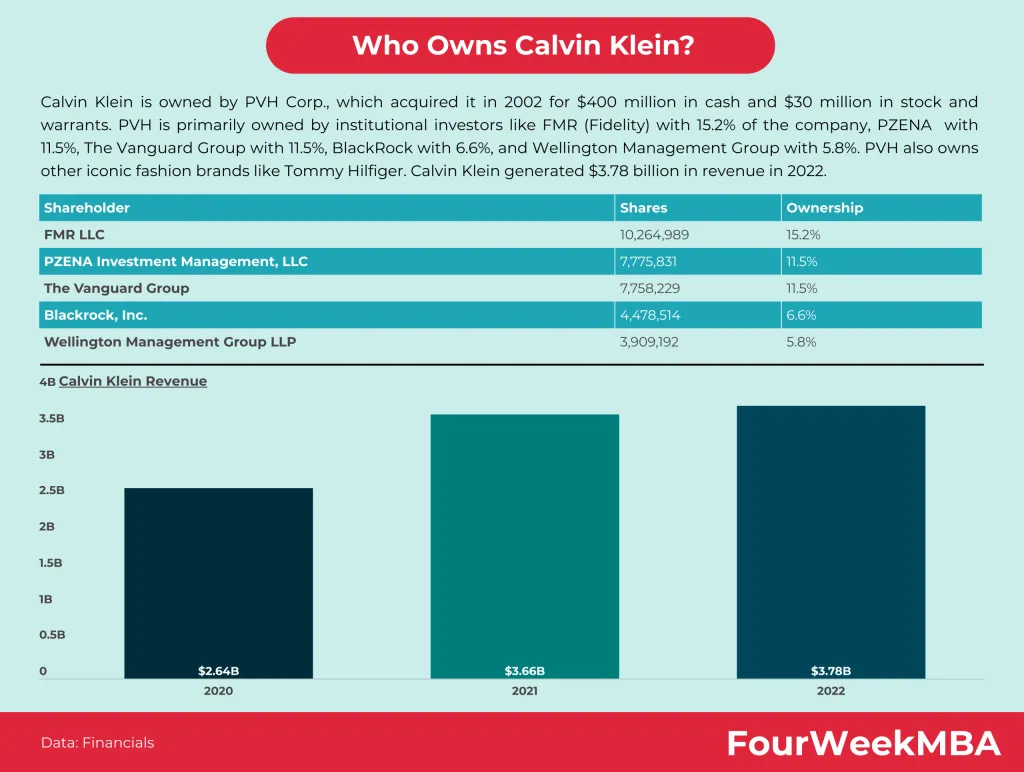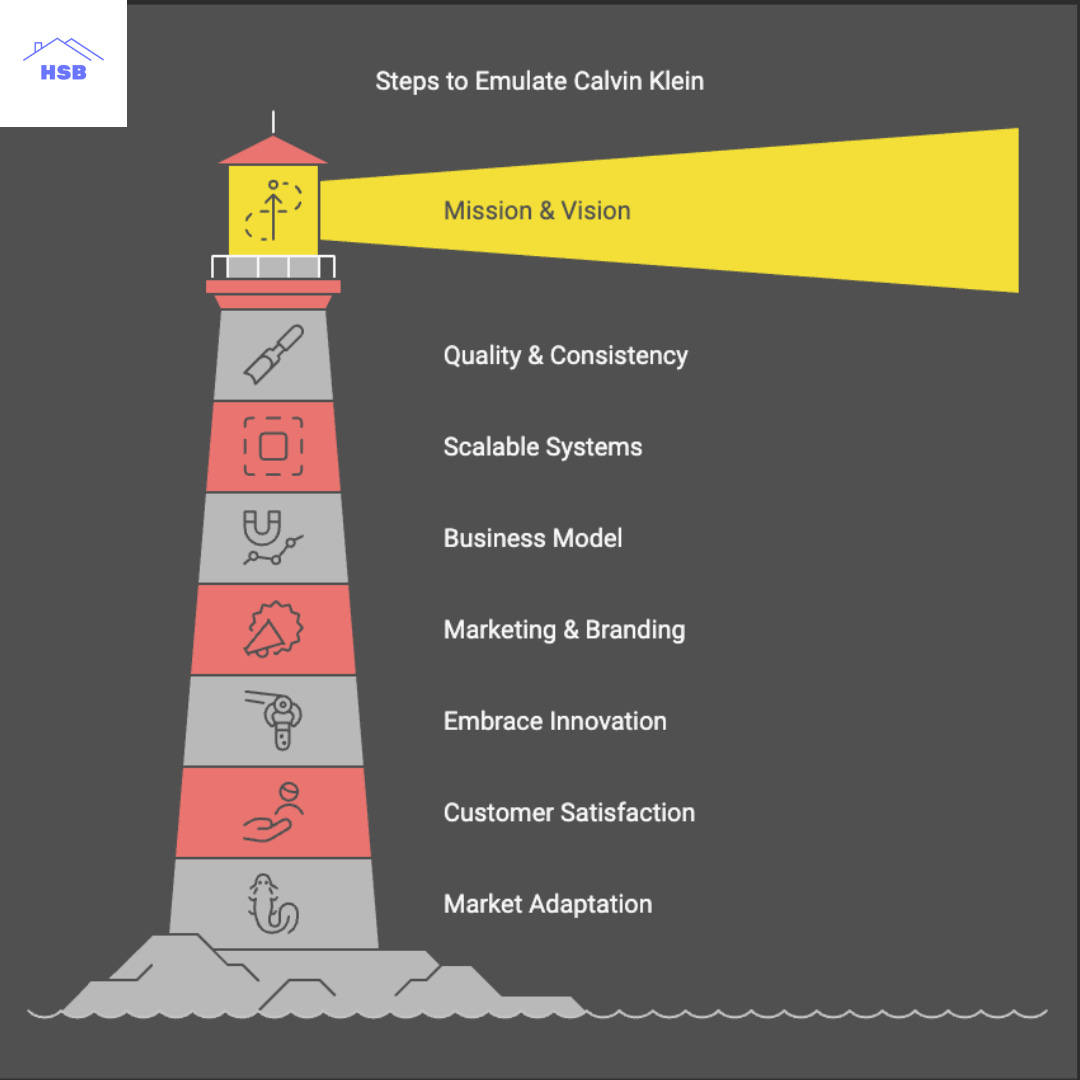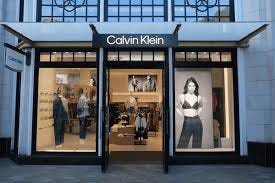Calvin Klein’s Global Fashion Empire: Unveiling the Business Behind the Iconic Brand
Discover how a global fashion icon’s Startup Innovation, E-commerce focus, and Stock Market influence can elevate your brand—open for instant inspiration!
Welcome to The Home School of Business!
100+ Posts | 14K+ Entrepreneurs
🚀Now Curated for General Public with more Visuals & Infographics.
Our Mission: Unlocking the secrets of businesses, brands, leaders, and more to inspire entrepreneurs everywhere.
💬Join our WhatsApp Channel (In a hurry? We’ve packed the highlights of the article right here, paired with the latest breaking news you can’t afford to miss.)
Check out the Quick Summary Insights & Top News Headlines on our Instagram
✨ Experience Home School of Business Podcasts on Spotify Today!
📲 Tap here to open Spotify and enjoy our latest episodes!
Why You'll Love Us:
Calvin Klein: A Comprehensive Business Case Study
Calvin Klein: The Iconic Brand Redefining Fashion and Lifestyle
In the dynamic and ever-evolving world of fashion, Calvin Klein stands as a beacon of minimalist elegance, innovative design, and cultural influence. Founded by Calvin Klein in 1968, the brand has transcended its origins to become a global powerhouse in apparel, fragrances, and lifestyle products. This article delves into Calvin Klein’s remarkable journey, analyzing the brand’s success through a business lens while maintaining an engaging and accessible narrative for the general reader.
Founding Story: From New York Visionary to Global Fashion Icon
Calvin Klein’s ascent to becoming a global fashion icon is a story of visionary design, strategic growth, and cultural resonance. Founded in 1968 in New York City, Calvin Klein initially launched as a coat shop on New York’s Upper East Side. Calvin Klein, a young and ambitious designer, aimed to create timeless, minimalist designs that emphasized clean lines and quality craftsmanship.
Klein’s breakthrough came with his introduction of the iconic Calvin Klein jeans in the early 1970s, which redefined denim fashion with their sleek, form-fitting silhouettes. The jeans quickly gained popularity, establishing Calvin Klein as a key player in the American fashion scene. Building on this success, the brand expanded into underwear, fragrances, and other apparel, leveraging Calvin Klein’s name and reputation for quality and style.
The brand’s ability to blend simplicity with sophistication resonated with consumers, setting Calvin Klein apart in a crowded market and laying the foundation for its global expansion.
History and Milestones: A Journey of Innovation and Influence
Since its inception, Calvin Klein has achieved numerous milestones that highlight its impact on fashion and its journey towards becoming one of the world’s most recognized brands:
1968: Calvin Klein launches his first coat shop on New York’s Upper East Side, introducing minimalist, high-quality outerwear.
1970: Introduces the first Calvin Klein jeans, revolutionizing denim fashion with sleek, tailored designs.
1982: Expands into the underwear market with the launch of Calvin Klein Underwear, setting new standards for men’s and women’s undergarments.
1984: Introduces Calvin Klein Obsession, the brand’s first fragrance for women, followed by men’s fragrances, establishing a strong presence in the perfume industry.
1993: Partners with designer fashion house Azzedine Alaïa for the Calvin Klein Collection, elevating the brand’s haute couture credentials.
2003: Launches Calvin Klein Jeans for Women, expanding the brand’s denim offerings and reinforcing its position in casual wear.
2016: Celebrates its 50th anniversary, marking five decades of innovation and cultural influence in the fashion industry.
2018: Introduces sustainable practices and eco-friendly materials in production, aligning with global sustainability trends.
2020: Expands into athleisure with the launch of Calvin Klein Active, catering to the growing demand for comfortable, stylish sportswear.
2023: Launches Calvin Klein Home, extending the brand’s minimalist aesthetic into home furnishings and decor.
2024: Plans to open flagship stores in major global cities, enhancing brand presence and customer accessibility.
2025: Continues to innovate with new collaborations and product lines, maintaining its influence in the fashion and lifestyle sectors.
These milestones reflect Calvin Klein’s strategic expansions, innovative initiatives, and its ability to adapt to the evolving fashion landscape under the brand’s leadership.
Rapid Growth: Leadership and Strategic Execution
Under Calvin Klein’s leadership, the brand has experienced meteoric growth, transforming from a niche coat shop into a globally recognized fashion powerhouse. Calvin Klein’s strategic execution is characterized by a focus on brand consistency, market expansion, and cultural relevance.
Key Strategies Behind Rapid Growth:
Brand Consistency and Minimalist Aesthetic:
Signature Style: Maintaining a consistent minimalist and sophisticated aesthetic across all product lines, ensuring brand recognition and loyalty.
Quality Craftsmanship: Emphasizing high-quality materials and meticulous craftsmanship, reinforcing the brand’s reputation for excellence.
Market Expansion and Diversification:
Product Diversification: Expanding into various categories such as underwear, fragrances, denim, and home furnishings to cater to a broad consumer base.
Global Presence: Establishing a strong international presence through strategic retail partnerships and flagship stores in key global markets.
Innovative Marketing and Cultural Relevance:
Iconic Advertising Campaigns: Launching memorable advertising campaigns that feature top models and celebrities, enhancing brand visibility and appeal.
Cultural Resonance: Tapping into contemporary cultural trends and societal shifts to keep the brand relevant and desirable.
Strategic Collaborations and Partnerships:
Designer Collaborations: Partnering with renowned designers and fashion houses to elevate the brand’s haute couture offerings and reach new audiences.
Celebrity Endorsements: Leveraging endorsements from influential celebrities and public figures to amplify brand prestige and attract diverse consumer segments.
Sustainability and Ethical Practices:
Eco-Friendly Initiatives: Implementing sustainable practices and using eco-friendly materials to align with global sustainability trends and consumer preferences.
Corporate Responsibility: Engaging in philanthropic efforts and promoting ethical business practices to build trust and loyalty among consumers.
Calvin Klein’s ability to blend brand consistency with strategic market expansions and cultural relevance has been instrumental in its rapid growth, establishing it as a dominant force in the global fashion industry.
Mission and Vision: Defining Timeless Elegance and Inclusivity
Calvin Klein’s mission and vision reflect a commitment to timeless elegance, inclusivity, and innovation in fashion and lifestyle products.
Mission: Calvin Klein’s mission is to “create timeless and sophisticated fashion and lifestyle products that empower individuals to express their unique style and embrace simplicity with elegance,” ensuring that each product embodies the brand’s legacy of quality and design.
Vision: Calvin Klein’s vision is to “be the world’s most influential and respected fashion brand, driving innovation and setting new standards for excellence and inclusivity in the fashion industry,” continuously evolving to meet the changing needs and preferences of global consumers.
Core Values:
Timeless Elegance: Upholding a classic and sophisticated aesthetic that transcends trends and stands the test of time.
Inclusivity: Committing to a diverse range of products that cater to all body types, skin tones, and personal styles, promoting a sense of belonging and empowerment.
Innovation: Continuously pushing the boundaries of fashion and lifestyle products through innovative design, technology, and sustainable practices.
Quality: Ensuring the highest standards in product formulation, design, and manufacturing to deliver exceptional quality to consumers.
Sustainability: Implementing eco-friendly practices and promoting sustainable fashion solutions to minimize environmental impact and promote ethical business practices.
Impact Goals: Calvin Klein aims to empower millions by providing high-quality, inclusive, and sustainable fashion and lifestyle products. The brand is dedicated to advancing sustainable practices, supporting philanthropic initiatives, and fostering a culture of inclusivity and diversity within the fashion industry. Additionally, Calvin Klein seeks to inspire future generations of designers and entrepreneurs through mentorship programs and educational partnerships.
Products and Services: Building a Comprehensive Fashion and Lifestyle Empire
Under Calvin Klein’s leadership, the brand has significantly expanded its range of products and services, creating a comprehensive fashion and lifestyle ecosystem that caters to the diverse needs of consumers.
Flagship Offerings:
Calvin Klein Apparel: A wide range of clothing for men and women, including jeans, dresses, suits, and casual wear, known for their minimalist design and superior quality.
Calvin Klein Underwear: Renowned for its comfortable and stylish undergarments, including underwear, bras, and loungewear, setting new standards in the intimate apparel market.
Calvin Klein Fragrances: A diverse collection of perfumes and colognes for men and women, featuring iconic scents like Calvin Klein Eternity and Calvin Klein Obsession.
Calvin Klein Jeans: High-quality denim products that emphasize sleek, tailored designs and exceptional craftsmanship.
Calvin Klein Home: A line of home furnishings and decor that extends the brand’s minimalist aesthetic into living spaces, including bedding, towels, and furniture.
Calvin Klein Active: Athleisure and sportswear collections that combine style and functionality, catering to the growing demand for comfortable and fashionable activewear.
Calvin Klein Watches and Accessories: A range of accessories, including watches, bags, belts, and sunglasses, that complement the brand’s apparel and enhance overall style.
Calvin Klein Kids: A line of children’s clothing that maintains the brand’s signature style while catering to the needs of younger consumers.
Calvin Klein Beauty: A beauty line offering makeup and skincare products that align with the brand’s commitment to quality and innovation.
Limited Edition Collections: Seasonal and special collaborations that create buzz and drive sales through exclusivity and unique designs.
Calvin Klein Subscription Boxes: Providing curated fashion and lifestyle products through a subscription-based model, offering exclusive items and personalized selections.
Customer Benefits: Calvin Klein’s ecosystem offers unparalleled convenience, quality, and style, allowing customers to access a wide range of fashion and lifestyle products that cater to their diverse needs. The brand’s commitment to innovation ensures that each product not only meets but exceeds customer expectations, delivering a seamless and enjoyable shopping experience. Additionally, Calvin Klein’s focus on sustainability and inclusivity enhances customer satisfaction and loyalty, fostering a strong and lasting relationship with consumers.
Market Position and Competition: Leading the Global Fashion Industry
In the highly competitive fashion industry, Calvin Klein has solidified its position as a leading brand through continuous innovation, strong brand identity, and strategic market expansions.
Industry Standing: Calvin Klein is one of the top players in the global fashion industry, competing with major brands like Ralph Lauren, Tommy Hilfiger, Hugo Boss, Armani, and DKNY. Its unique blend of minimalist design, high-quality products, and strategic marketing has helped it capture a significant market share, particularly among millennials and Gen Z consumers.
Competitive Edge:
Minimalist Aesthetic: Calvin Klein’s signature minimalist design sets it apart, appealing to consumers seeking simplicity and sophistication in their fashion choices.
Brand Consistency: Maintaining a consistent brand image across all product lines ensures strong brand recognition and loyalty.
Product Diversification: Offering a wide range of products across apparel, underwear, fragrances, home furnishings, and beauty, catering to diverse consumer needs and preferences.
Innovative Marketing: Launching iconic advertising campaigns and leveraging celebrity endorsements to enhance brand visibility and appeal.
Sustainability Initiatives: Implementing eco-friendly practices and promoting sustainable fashion solutions to attract environmentally conscious consumers.
Global Presence: Establishing a strong international presence through flagship stores and strategic retail partnerships in key global markets.
Quality Assurance: Emphasizing high-quality materials and meticulous craftsmanship ensures exceptional product performance and durability.
Strategic Collaborations: Partnering with renowned designers and fashion houses to elevate the brand’s haute couture offerings and reach new audiences.
Calvin Klein’s ability to blend minimalist design with strategic market expansions and innovative marketing has been key to its sustained leadership and competitive edge in the global fashion industry.
Financial Performance: Robust Growth and Strategic Investments
Calvin Klein’s financial trajectory showcases its robust growth and strategic foresight in navigating the competitive fashion and lifestyle landscape.
Revenue Growth: Calvin Klein has consistently reported strong revenue growth, driven by an expanding product portfolio, strategic market expansions, and a loyal customer base. In fiscal year 2023, Calvin Klein reported revenues exceeding $5 billion, reflecting its strong market presence and operational scalability.
Investment and Funding: Calvin Klein has strategically reinvested its profits into expanding its business ventures, enhancing technological infrastructure, and exploring new growth avenues. Notable investments include:
Research and Development: Continuous investment in R&D to drive innovation and develop new products that set industry standards.
Infrastructure Expansion: Building state-of-the-art manufacturing facilities and expanding existing ones to increase production capacity without compromising quality.
Sustainability Initiatives: Significant funding towards renewable energy projects, sustainable manufacturing practices, and eco-friendly product technologies.
Global Market Penetration: Expanding retail presence in emerging markets, including Asia and Europe, to capture new customer bases.
Talent Acquisition: Attracting and retaining top-tier talent in design, marketing, and operations to drive innovation and maintain competitive edge.
Strategic Acquisitions: Acquiring complementary companies and technologies to enhance Calvin Klein’s product offerings and technological capabilities.
Profitability: Calvin Klein maintains a strong profitability profile, with consistent earnings driven by high-margin luxury products, efficient operations, and strategic cost management. The company’s ability to sustain profitability while expanding globally underscores its financial robustness and strategic planning. Calvin Klein continues to generate significant free cash flow, enabling it to reinvest in growth initiatives, expand its service offerings, and provide value to shareholders through dividends and equity offerings.
Leadership and Management: Visionary Guidance
Calvin Klein’s leadership and management team have been instrumental in steering the brand towards sustained growth and innovation.
Key Figures:
Calvin Klein (Founder): The visionary founder who established the brand’s minimalist and sophisticated aesthetic, driving its early success and enduring legacy.
Michael Kors (Executive Chairman): Overseeing strategic initiatives and guiding the brand’s global expansion efforts.
Marc Jacobs (Creative Director): Leading the creative direction, ensuring that Calvin Klein’s designs remain fresh, innovative, and aligned with contemporary fashion trends.
Neha Vora (Chief Marketing Officer): Manages marketing strategies, building Calvin Klein’s brand presence and driving customer engagement through innovative campaigns.
Rita Soraya (Head of Customer Relations): Oversees customer support and success teams, ensuring high levels of customer satisfaction and loyalty.
Daniel Garcia (Chief Financial Officer): Manages financial operations, ensuring sustainable growth and profitability through strategic financial planning and management.
Strategic Decisions: Under Calvin Klein’s leadership, the brand has focused on diversifying its product offerings, investing in technology to optimize operations, and forging strategic partnerships to enhance its value proposition. Key strategic decisions include:
Expansion of Product Lines: Continuously introducing new products in apparel, underwear, fragrances, and home furnishings to cater to evolving consumer preferences.
Digital Transformation: Investing in e-commerce platforms and digital marketing to enhance online presence and sales.
Sustainable Practices: Implementing eco-friendly manufacturing processes and sustainable sourcing of materials to reduce environmental impact.
Global Market Penetration: Expanding Calvin Klein’s presence in international markets through strategic marketing and localized service offerings.
Strategic Collaborations: Forming alliances with fashion designers, influencers, and technology providers to enhance product offerings and brand prestige.
Philanthropic Initiatives: Investing in social causes through the Calvin Klein Foundation, promoting education, health, and community development.
Calvin Klein’s strategic vision and ability to execute complex initiatives have been crucial in maintaining the brand’s market leadership and driving its continued success.
Corporate Culture and Employee Insights: Fostering Innovation and Excellence
Calvin Klein is renowned for its dynamic and inclusive corporate culture, which emphasizes innovation, collaboration, and employee well-being.
Work Environment: Calvin Klein fosters a vibrant workplace where creativity and teamwork thrive. The company’s headquarters are designed to inspire collaboration, featuring open spaces, recreational areas, and amenities that cater to employees' needs. Calvin Klein promotes a culture of continuous learning and development, encouraging employees to take initiative and contribute to the company’s innovative projects. The organization also emphasizes work-life balance, offering flexible working arrangements and wellness programs to support employee health and productivity.
Employee Success Stories: Employees at Calvin Klein often highlight the company's supportive environment and opportunities for professional growth. For instance, Sneha Rao, a software engineer at Calvin Klein, shares: "Calvin Klein provides a platform where my ideas are valued and implemented. The collaborative culture and emphasis on continuous learning have been crucial in my career development."
Another example is Rahul Sharma, a product manager, who states: "Working at Calvin Klein has been an incredible journey. The focus on innovation and the supportive work environment push me to deliver my best every day."
Innovation and Research & Development: Driving Fashion Excellence
Calvin Klein’s commitment to innovation is evident in its continuous investment in research and development, aimed at enhancing product quality and operational efficiency.
Technological Advancements:
Advanced Fabrics and Materials: Continuously developing and integrating innovative fabrics and materials to enhance comfort, durability, and style in apparel and underwear.
Sustainable Manufacturing: Implementing eco-friendly manufacturing technologies and processes to reduce environmental impact and promote sustainability.
AI and Machine Learning: Leveraging AI and machine learning to analyze consumer preferences, optimize product offerings, and personalize marketing strategies.
Virtual Try-Ons: Implementing augmented reality (AR) technologies for virtual try-ons, allowing customers to visualize products before purchase.
Data-Driven Insights: Utilizing big data and analytics to understand market trends, consumer behavior, and product performance, informing strategic decisions.
Smart Wearables: Developing smart fashion products that integrate technology for enhanced functionality and user experience.
Future Projects: Calvin Klein is exploring the integration of robotic process automation (RPA) in manufacturing operations to enhance efficiency and reduce manual intervention. Additionally, the company is investing in blockchain technology to improve supply chain transparency and traceability, ensuring the integrity and reliability of materials used in product manufacturing. Calvin Klein is also expanding its research in biotechnology, aiming to create sustainable materials and enhance product efficacy through innovative formulations.
Calvin Klein’s relentless pursuit of innovation ensures that it remains at the forefront of fashion advancements, continuously setting new standards in the industry.
Social Responsibility and Sustainability: Balancing Profit with Purpose
Calvin Klein integrates social responsibility and sustainability into its business model, striving to make a positive impact on society and the environment.
CSR Initiatives:
Calvin Klein Foundation: Supporting educational initiatives, cultural projects, and community development programs to promote art, science, and social welfare.
Youth Development Programs: Investing in programs that nurture young talent in fashion design, marketing, and entrepreneurship, fostering the next generation of fashion innovators.
Community Engagement: Partnering with local communities in key markets to support infrastructure development, education, and healthcare initiatives.
Environmental Conservation: Implementing initiatives aimed at reducing environmental impact, such as tree planting drives and wildlife conservation projects.
Diversity and Inclusion: Promoting diversity and inclusion within the fashion industry through inclusive product lines and supportive workplace policies.
Sustainability Practices: Calvin Klein is dedicated to reducing its environmental footprint through various sustainability measures:
Carbon Neutral Operations: Committing to achieve carbon neutrality across all operations by investing in renewable energy projects and carbon offset initiatives.
Eco-Friendly Manufacturing: Utilizing energy-efficient technologies in manufacturing facilities, including the use of renewable energy sources and advanced waste management systems.
Sustainable Sourcing: Committing to sourcing materials responsibly, including partnerships with sustainable suppliers and minimizing resource usage.
Green Product Design: Designing products with sustainability in mind, using recyclable and biodegradable materials to minimize waste.
Water Conservation: Implementing water-saving technologies and practices in manufacturing processes to reduce water consumption and promote conservation efforts.
Calvin Klein’s comprehensive approach to sustainability not only reduces its environmental impact but also sets a benchmark for other companies to follow.
Customer Engagement and Community Building: Building Lasting Relationships
Calvin Klein prioritizes building strong relationships with its customers through personalized interactions and active community involvement.
Customer Relationships:
Calvin Klein engages with its user base through various channels, including social media, feedback surveys, and customer support services. The company leverages data analytics to understand customer preferences, enabling personalized recommendations and tailored marketing strategies that enhance user satisfaction. Calvin Klein’s exclusive events, such as fashion shows, product launch parties, and influencer meet-and-greets, further strengthen customer relationships by providing unique and memorable interactions with the brand.
Community Involvement:
Calvin Klein actively participates in community programs and partners with local businesses to strengthen its ties with the communities it serves. Initiatives like Calvin Klein Community Labs, which support local startups and provide mentorship, and collaborations with educational institutions to promote financial literacy and fashion education, demonstrate Calvin Klein’s commitment to community engagement. Additionally, Calvin Klein organizes charity events and fundraisers to support various social causes, reinforcing its role as a responsible and engaged corporate citizen.
Challenges and Opportunities: Navigating a Dynamic Market
Despite its success, Calvin Klein faces several challenges and opportunities as it continues to expand and innovate.
Current Challenges:
Intense Competition: The global fashion market is highly competitive, with players like Ralph Lauren, Tommy Hilfiger, Hugo Boss, Armani, and DKNY vying for market share.
Regulatory Hurdles: Navigating diverse regulatory landscapes related to product safety, marketing, and environmental standards, which can impact operations and product offerings.
Technological Disruptions: Staying ahead of rapid technological advancements and ensuring continuous innovation to maintain a competitive edge.
Economic Volatility: Managing the impact of global economic fluctuations on consumer spending and operational costs.
Sustainability Pressures: Meeting increasing expectations for sustainable practices and reducing environmental impact amidst global climate challenges.
Talent Acquisition and Retention: Attracting and retaining top-tier talent in design, marketing, and operations to drive innovation and maintain competitive advantage.
Brand Authenticity: Maintaining brand authenticity and personal connection with consumers as the brand expands globally.
Future Opportunities:
Emerging Technologies: Investing in emerging technologies like augmented reality (AR) for virtual try-ons and AI-driven personalization to enhance customer experiences.
Global Market Expansion: Expanding Calvin Klein’s presence in emerging markets by tailoring products and services to meet local needs and preferences, unlocking significant growth potential.
Service Diversification: Introducing new service verticals such as personalized wellness programs, luxury fashion retreats, and high-end fashion consultancy to diversify revenue streams and cater to evolving customer needs.
Sustainable Innovations: Leading the industry in sustainable fashion development by incorporating eco-friendly materials and green manufacturing processes, attracting environmentally conscious consumers.
Strategic Partnerships: Forming alliances with technology providers, fashion designers, and influencers to enhance service offerings and drive technological advancements.
Health and Wellness Technologies: Expanding into health-related technologies, such as wearable fashion devices and AI-driven style analysis tools, to tap into the growing health and wellness market.
Digital Transformation: Leveraging digital transformation to enhance customer engagement, streamline operations, and create new business models through e-commerce and digital marketing.
Calvin Klein’s ability to navigate these challenges and capitalize on opportunities will be crucial in maintaining its leadership position in the global fashion industry and driving its continued success.
Future Plans and Strategic Vision: Shaping the Future of Fashion and Lifestyle
Calvin Klein’s strategic vision focuses on sustained growth, innovation, and expanding its service offerings to meet evolving customer needs across fashion and lifestyle sectors.
Growth Strategies:
Expanding Product Lines: Continuously developing new products in apparel, underwear, fragrances, and home furnishings to cater to evolving consumer preferences and market trends.
International Expansion: Exploring new international markets to replicate Calvin Klein’s success in established regions, increasing global accessibility and customer base.
Diversifying Offerings: Launching new products and services, such as Calvin Klein Wellness, a line of wellness and self-care products, and Calvin Klein Fashion Experiences, offering personalized fashion consultations and workshops.
Investing in Technology: Leveraging AI and machine learning to create personalized fashion solutions, enhancing customer experiences through data-driven insights.
Sustainable Practices: Implementing comprehensive sustainability initiatives to reduce environmental impact and promote renewable energy usage across all operations.
Enhancing Digital Infrastructure: Investing in digital tools and platforms to improve customer engagement, streamline operations, and offer personalized services.
Innovation in Consumer Hardware: Developing proprietary fashion technologies, such as advanced wearable devices and smart fabrics, to enhance the user experience and provide cutting-edge solutions.
Long-Term Goals:
Over the next 5-10 years, Calvin Klein aims to become the most comprehensive and sustainable fashion and lifestyle brand globally. The vision includes seamlessly integrating various services—apparel, underwear, fragrances, home furnishings, and personalized fashion experiences—into a unified ecosystem that enhances daily life for millions of customers. Additionally, Calvin Klein is committed to leading the way in sustainable business practices, ensuring that all operations contribute positively to the environment and society. The long-term vision includes fostering financial inclusion, supporting innovative startups through the Calvin Klein Foundation, and continuously empowering individuals to achieve their fashion and lifestyle goals through accessible and affordable solutions.
Building a Similar Brand: Roadmap for Aspiring Entrepreneurs
For those inspired by Calvin Klein’s success and aiming to build a similar brand, the following roadmap outlines key steps and strategies:
Develop a Clear Mission and Vision:
Define the core purpose of your business.
Establish long-term goals that align with your mission.
Focus on Quality and Consistency:
Ensure high-quality products and services.
Implement standardized processes to maintain consistency across all locations.
Implement Scalable Systems and Processes:
Develop efficient operational systems that can be easily replicated.
Invest in technology to streamline operations and enhance customer experience.
Adopt a Scalable Business Model:
Consider direct-to-consumer sales and e-commerce to facilitate rapid expansion.
Ensure your business model can adapt to different markets and scales.
Invest in Marketing and Brand Building:
Create a strong brand identity that resonates with your target audience.
Utilize diverse marketing channels, including digital marketing, to build brand awareness.
Embrace Innovation:
Continuously innovate your product offerings to stay ahead of market trends.
Invest in research and development to enhance your offerings and operational efficiency.
Commit to Customer Satisfaction:
Prioritize customer feedback and continuously improve based on their needs.
Foster strong customer relationships through excellent service and engagement.
Build a Strong Supply Chain:
Develop reliable partnerships with suppliers to ensure consistent quality and availability of products.
Optimize your supply chain to reduce costs and enhance efficiency.
Focus on Operational Excellence:
Streamline operations to maximize efficiency and reduce waste.
Implement best practices in management and operations to drive productivity.
Ensure Sustainable Practices:
Adopt eco-friendly practices to minimize your environmental footprint.
Promote sustainability as a core value to attract environmentally conscious consumers.
Cultivate a Positive Corporate Culture:
Foster an inclusive and collaborative work environment.
Invest in employee training and development to build a motivated and skilled workforce.
Adapt to Market Dynamics:
Stay attuned to changing market trends and consumer preferences.
Be agile and ready to pivot your strategies to meet evolving demands.
By following this roadmap, aspiring entrepreneurs can emulate Calvin Klein’s success, building a brand that combines business acumen with a mission-driven approach to create lasting value and impact.
Customer Success Stories and Case Studies: Real-Life Impact
Calvin Klein’s commitment to excellence is reflected in the positive experiences of its customers and partners.
Real-Life Examples:
Aisha Khan, a fashion enthusiast in Dubai, shares: "Calvin Klein has transformed my wardrobe. The quality and design of their apparel are unmatched, making every outfit a statement of elegance and simplicity."
Rajesh Verma, owner of a local boutique, states: "Partnering with Calvin Klein has significantly enhanced my boutique's offerings. Their reliable supply and exceptional products have attracted more discerning customers and boosted our sales."
Testimonials:
Customers consistently praise Calvin Klein for its high-quality products, timeless designs, and exceptional customer service. For instance, Meera Joshi, a marketing executive in Bangalore, says: "Calvin Klein’s user-friendly purchasing process and personalized services make shopping seamless. The attention to detail and quality assurance ensure that every product I buy is a delight."
Industry Trends and Company Adaptation: Staying Ahead of the Curve
The fashion industry is constantly evolving, influenced by technological advancements and changing consumer behaviors. Calvin Klein adeptly adapts to these trends to maintain its competitive edge.
Market Trends:
Sustainable Fashion: Growing consumer awareness about environmental impact drives demand for eco-friendly products and sustainable business practices.
Technological Integration: Advancements in AI, machine learning, and augmented reality are transforming product development, customer engagement, and supply chain management.
Personalization and Customization: Rising demand for personalized and bespoke fashion solutions tailored to individual preferences influences product development and marketing strategies.
Health and Wellness: Increasing focus on health and wellness drives demand for comfortable, functional, and stylish athleisure and sportswear.
Social Media Influence: Enhanced use of social media platforms for marketing, brand building, and customer engagement.
Inclusivity and Diversity: Growing emphasis on inclusivity and diversity influences product offerings, ensuring representation for all body types, skin tones, and personal styles.
E-commerce Growth: Continued growth of e-commerce and direct-to-consumer sales channels reshapes the retail landscape, emphasizing the importance of online presence and digital marketing.
Strategic Adjustments:
Calvin Klein stays ahead by continuously enhancing its technological capabilities, expanding its service offerings, and committing to sustainable and ethical practices. The introduction of AI-driven personalization in fashion, investment in sustainable fabric technologies, and expansion into virtual fashion shows exemplify Calvin Klein’s proactive approach to market trends. Additionally, Calvin Klein’s focus on digital transformation and robust sustainability initiatives ensures customer trust and loyalty in an increasingly conscious market.
Engaging the Reader: The Human Side of Calvin Klein
Behind Calvin Klein’s impressive achievements are the passionate individuals who drive the company forward. From visionary leaders to dedicated employees, each team member plays a crucial role in Calvin Klein’s success story.
Highlighting Human Interest:
Stories like Amit Sharma’s journey as a Calvin Klein designer and Sneha Rao’s experience as a marketing manager add a personal touch to the company's narrative. These human elements make Calvin Klein’s story relatable and inspiring, resonating with readers on a deeper level. Employees share their experiences of working in a dynamic and innovative environment, highlighting the company’s commitment to fostering creativity and professional growth.
Conclusion: A Bright Future Ahead
Calvin Klein’s relentless pursuit of excellence, operational efficiency, and customer satisfaction has positioned the brand as a trailblazer in the global fashion and lifestyle industries. With a clear vision, strong leadership, and a commitment to expanding its service offerings, Calvin Klein is well-equipped to navigate the challenges ahead and seize new opportunities.
As the company continues to redefine the boundaries of what’s possible in fashion and lifestyle, it remains dedicated to making elegance and simplicity more accessible and enjoyable for millions of customers. Calvin Klein is not just a fashion brand; it’s a testament to what can be achieved when vision meets execution. For individuals seeking timeless elegance and sophisticated style, Calvin Klein stands as a beacon of modern fashion excellence, promising a future where innovative technologies and minimalist design coexist seamlessly.
Calvin Klein exemplifies how a brand can blend technological innovation with a mission-driven approach, creating value that transcends profit and contributes to the greater good. As we look ahead, Calvin Klein’s legacy of innovation and influence promises to continue shaping the fashion and lifestyle landscape for generations to come.
HSB Important Articles and References :Share your feedback and tell us which case studies you'd like to see next by filling out this quick Google form! Click Here
Check and follow up:
1) WhatsApp Channel : Click Here
2) Instagram : https://www.instagram.com/homeschoolofbusiness.in/
Calvin Klein (The Founder) : Click Here
Calvin Klein (The Fashion House) : Click Here
The Business Model : Click Here
The Marketing Strategy : Click Here
The Financials : Click Here
The Founding Story : Click Here
HSB Video Vault :-
What The Home School of Business Offers:
Business News Letters We Offer:
Business Case Study Series, Scam Series, Leadership Series, Industry Series, City Series, 5 Minute reads.
Your journey from an idea to IPO starts here!
Visit our website for all Posts: CLICK HERE
Best Regards,
The Home School of Business Team






